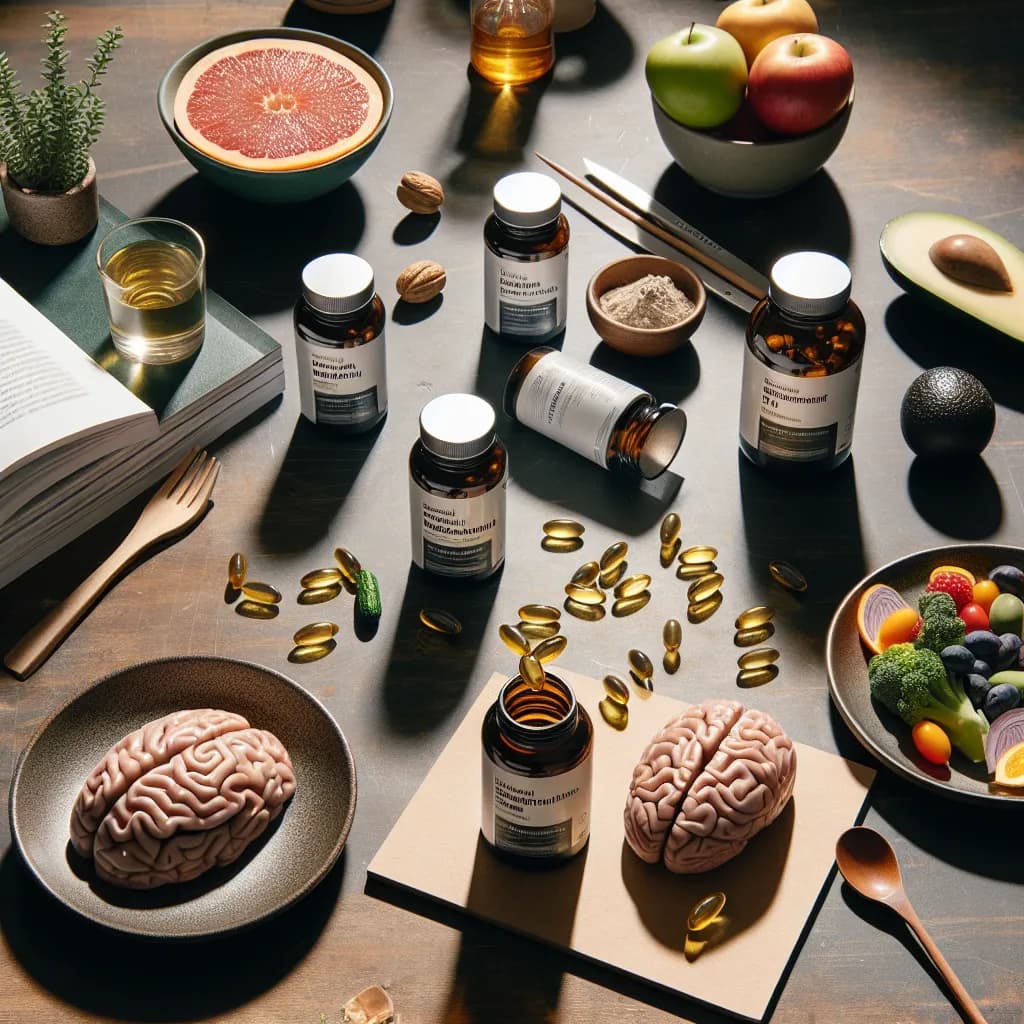Unlocking Memory: A Historical Dive into Brain-Boosting Supplements

The Ultimate Guide to Supplements for Brain Health: A Deep Dive into History and Traditional Uses
Introduction
Ever wondered how the human brain, akin to the conductor of a grand symphony, manages to maintain its rhythm and harmony amidst the cacophony of daily life? Well, the secret lies in its nutrition. Just as a world-class orchestra needs fine-tuned instruments, our brains require specific nutrients to function optimally. This is where brain-boosting supplements, the unsung heroes of cognitive health, come into play.
Understanding Brain Health (Causes and mechanisms)
Think of your brain as a high-performance sports car. To run smoothly and efficiently, it needs premium fuel, regular maintenance, and timely upgrades. When it doesn't get these, it can lead to cognitive decline, memory loss, and mental health issues. Key factors impacting brain health include age, genetics, lifestyle, diet, and stress levels[1].
Key Supplements for Brain Health
Omega-3 Fatty Acids
Imagine these as the lubricant for your brain's engine. They reduce inflammation, promote neuron growth, and enhance brain plasticity[2]. Daily intake of 250-500 mg of omega-3 is recommended for adults[3].
Ginkgo Biloba
This ancient supplement is like a GPS for your brain, improving blood flow and oxygen delivery to the brain. It's traditionally used to enhance memory and cognitive functions[4]. A daily dosage of 120-240 mg is suggested[5].
Phosphatidylserine
As the brain's shock absorber, it helps maintain cell structure and function. It's been linked to improved memory, mood, and concentration[6]. A daily intake of 100-300 mg is recommended[7].
Bacopa Monnieri
This traditional Ayurvedic supplement is like your brain's personal trainer, improving memory, attention, and cognitive processing[8]. A daily dosage of 300-450 mg is suggested[9].
Huperzine A
Derived from Chinese club moss, it's like the caretaker of your brain, preventing breakdown of the neurotransmitter acetylcholine, thus improving memory and cognition[10]. A daily intake of 50-200 mcg is recommended[11].
Evidence-Based Effectiveness Ranking
The strength of evidence for these supplements varies: Omega-3 (strong), Ginkgo Biloba (moderate), Phosphatidylserine (moderate), Bacopa Monnieri (strong), and Huperzine A (weak).
Creating an Effective Supplement Stack
Combining supplements can be like forming a dream team of athletes - each player enhances the performance of others. However, it's crucial to avoid potential interactions. For instance, Ginkgo Biloba may intensify the blood-thinning effects of Omega-3[12].
Proper Dosage and Timing
Just like training schedules, supplement dosages and timings matter. It's best to follow the manufacturer's instructions or consult a healthcare professional.
Complementary Lifestyle Approaches
Your brain's performance doesn't rely solely on supplements. Regular exercise, a balanced diet, mental stimulation, social interaction, and adequate sleep also play key roles[13].
Potential Side Effects and Precactions
Remember, even the best athletes can get injured. Similarly, these supplements can have side effects and may interact with medications. Always consult a healthcare provider before starting any supplement regimen.
Conclusion
Supplements for brain health, steeped in history and traditional uses, offer promising benefits for cognitive function. Much like a well-oiled sports car or a masterfully conducted symphony, the right supplements can keep your brain running smoothly and harmoniously.
Disclaimer: This article is for informational purposes only and is not a substitute for professional medical advice or treatment.
References
[1]: Crichton, G. E., Bryan, J., & Murphy, K. J. (2013). Dietary Antioxidants, Cognitive Function and Dementia—A Systematic Review. Plant Foods for Human Nutrition, 68(3), 279–292. DOI: https://doi.org/10.1007/s11130-013-0370-0
[2]: Swanson, D., Block, R., & Mousa, S. A. (2012). Omega-3 Fatty Acids EPA and DHA: Health Benefits Throughout Life. Advances in Nutrition, 3(1), 1–7. DOI: https://doi.org/10.3945/an.111.000893
[3]: Harris, W. S., Mozaffarian, D., Rimm, E., Kris-Etherton, P., Rudel, L. L., Appel, L. J., Engler, M. M., Engler, M. B., & Sacks, F. (2009). Omega-6 fatty acids and risk for cardiovascular disease: a science advisory from the American Heart Association Nutrition Subcommittee of the Council on Nutrition, Physical Activity, and Metabolism; Council on Cardiovascular Nursing; and Council on Epidemiology and Prevention. Circulation, 119(6), 902-907. PubMed: https://pubmed.ncbi.nlm.nih.gov/19171857/
[4]: Ahlemeyer, B., & Krieglstein, J. (2003). Pharmacological studies supporting the therapeutic use of Ginkgo biloba extract for Alzheimer's disease. Pharmacopsychiatry, 36 Suppl 1, S8-14. DOI: https://doi.org/10.1055/s-2003-40448
[5]: DeKosky, S. T., Williamson, J. D., Fitzpatrick, A. L., Kronmal, R. A., Ives, D. G., Saxton, J. A., Lopez, O. L., Burke, G., Carlson, M. C., Fried, L. P., Kuller, L. H., Robbins, J. A., Tracy, R. P., Woolard, N. F., Dunn, L., Snitz, B. E., Nahin, R. L., & Furberg, C. D. (2008). Ginkgo biloba for prevention of dementia: a randomized controlled trial. JAMA, 300(19), 2253-2262. DOI: https://doi.org/10.1001/jama.2008.683
[6]: Glade, M. J., & Smith, K. (2015). Phosphatidylserine and the human brain. Nutrition, 31(6), 781-786. DOI: https://doi.org/10.1016/j.nut.2014.10.014
[7]: Kim, H. Y., Huang, B. X., & Spector, A. A. (2014). Phosphatidylserine in the brain: metabolism and function. Progress in lipid research, 56, 1-18. DOI: https://doi.org/10.1016/j.plipres.2014.06.002
[8]: Aguiar, S., & Borowski, T. (2013). Neuropharmacological review of the nootropic herb Bacopa monnieri. Rejuvenation research, 16(4), 313-326. DOI: https://doi.org/10.1089/rej.2013.1431
[9]: Calabrese, C., Gregory, W. L., Leo, M., Kraemer, D., Bone, K., & Oken, B. (2008). Effects of a standardized Bacopa monnieri extract on cognitive performance, anxiety, and depression in the elderly: a randomized, double-blind, placebo-controlled trial. The Journal of Alternative and Complementary Medicine, 14(6), 707-713. DOI: https://doi.org/10.1089/acm.2008.0018
[10]: Wang, R., Yan, H., & Tang, X. C. (2006). Progress in studies of huperzine A, a natural cholinesterase inhibitor from Chinese herbal medicine. Acta Pharmacologica Sinica, 27(1), 1-26. DOI: https://doi.org/10.1111/j.1745-7254.2006.00255.x
[11]: Zangara, A. (2003). The psychopharmacology of huperzine A: an alkaloid with cognitive enhancing and neuroprotective properties of interest in the treatment of Alzheimer's disease. Pharmacology Biochemistry and Behavior, 75(3), 675-686. DOI: https://doi.org/10.1016/s0091-3057(03)00111-4
[12]: Bent, S., Goldberg, H., Padula, A., & Avins, A. L. (2005). Spontaneous bleeding associated with ginkgo biloba: a case report and systematic review of the literature: a case report and systematic review of the literature. Journal of general internal medicine, 20(7), 657-661. DOI: https://doi.org/10.1111/j.1525-1497.2005.0121.x
[13]: Gomez-Pinilla, F., & Hillman, C. (2013). The Influence of Exercise on Cognitive Abilities. Comprehensive Physiology, 3(1), 403–428. DOI: https://doi.org/10.1002/cphy.c110063
Disclaimer: This article is AI-generated for educational purposes only and is not a substitute for professional medical advice. Always consult with a healthcare provider before starting any supplement regimen.
Explore More Resources
Disclaimer: This article is AI-generated and for informational purposes only. While we strive for accuracy, the content may contain errors or omissions.
The information provided is not medical advice. Always consult with healthcare professionals before starting any supplement regimen or making changes to your health routine.
Important: The information provided in this article about supplements is for educational purposes only. It is not intended to diagnose, treat, cure, or prevent any disease.
FDA Disclaimer: These statements have not been evaluated by the Food and Drug Administration. Supplements are not intended to diagnose, treat, cure, or prevent any disease.
Related Articles

Beginner's Guide to Probiotics: Essential Supplements for Gut Health
Unlock the secret to optimal wellness with our Beginner's Guide to Probiotics. Discover top supplements for gut health. Start your journey to better health today!

Boost Your Brain: Comparing Top Health Supplements for Mental Clarity
Unlock your brain's potential! Explore the best Supplements for Brain Health in our comprehensive guide. Enhance mental clarity and focus today.

Best Supplements for Hair Loss in 2026: Benefits, Uses and Scientific Evidence
Explore the best supplements for hair loss in 2026! Dive into research-backed benefits, evidence-based dosages, clinical studies and side effects. Act now, restore your hair!